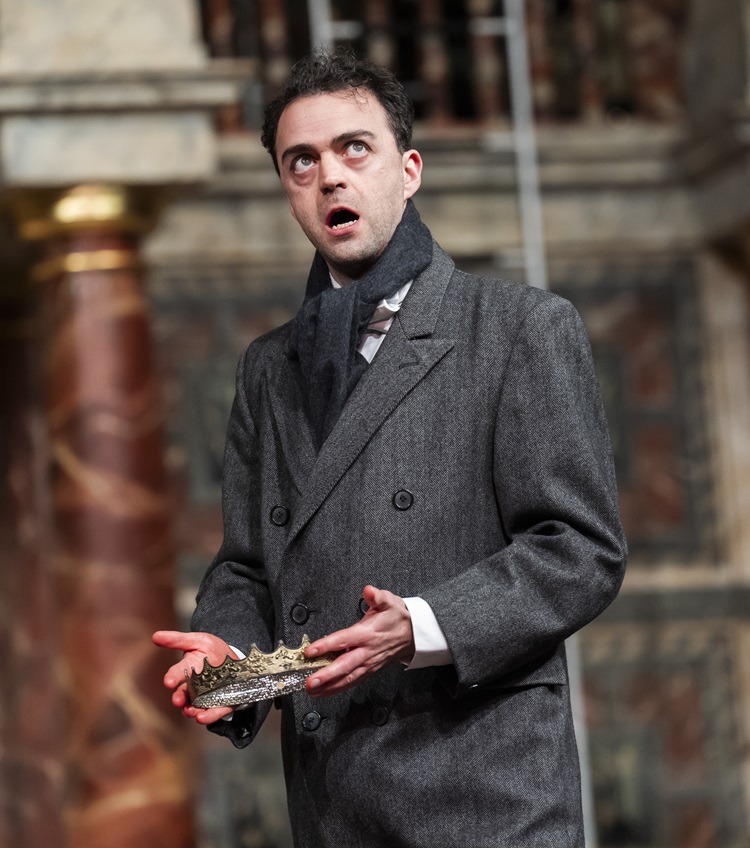
Playing Shakespeare at The Globe
Nicolette Jones reviews the Globe Theatre’s Playing Shakespeare production of the Scottish play.
An audience of teenagers at the Globe is probably as close as the theatre can get to the original Elizabethan crowd watching Shakespeare. They chat among themselves, they come and go and they respond noisily to the things they appreciate. The Playing Shakespeare productions, sponsored by Deutsche Bank, have so far reached 350,000 students aged 11 to 16, for whom the specially adapted plays are free. The school performance of Macbeth that I saw ran for an hour and a half with no interval to a full house, with youngsters packed into the pit as well as seated on the benches. The Globe, of course, is outdoors and it was a chilly day (3 degrees). Holding the attention of an audience in the cold and on their feet is quite a task.

A scene from Macbeth by William Shakespeare @ Shakespeare’s Globe. A Playing Shakespeare with Deutsche Bank production. Directed by Lucy Cuthbertson.
©Tristram Kenton
The cast projected like mad and the director had clearly understood that visual impact mattered and would create the most audience response. There were inspired ideas. The witches were acrobats, prompting gasps as they cartwheeled and tumbled. The most showstopping highlight was the witch whose hand was on fire. Planning the murder of Duncan, Lady Macbeth provided plastic sheets to cover the floor, and disposable coveralls to protect the killers and the crime scene from the blood. So in the madness scene, Lady Macbeth’s “Out, damned spot” alluded to tell-tale stains on the floor, which she scrubbed desperately, rather than on her hand. It told the story in a convincing contemporary way.
Weird sisters aside, there were loudest reactions for kisses and fights. There was even a concerted ‘aaaah’ for the first embrace that reunited Macbeth with his wife, even though she had just been considering whether she could persuade her husband to murder the king. There was more fighting on stage than usual: one resistor headbutted Macbeth. And Lady Macduff fought valiantly back against the murderous soldiers that came for her and her children. I was not the only one punching the air through her struggle – in the hope that this time, for once, the

A scene from Macbeth by William Shakespeare @ Shakespeare’s Globe. A Playing Shakespeare with Deutsche Bank production. Directed by Lucy Cuthbertson.
©Tristram Kenton
most brutal scene of all would end differently. But no, babies were run through with daggers as expected.
It was reassuring to me that the audience voiced its disapproval when knives were produced (“Is this a dagger …?”) and booed when a man slapped a woman. Clearly these things are red flags for the young of this generation. This adaptation was in modern dress with everyone in military attire – mostly battle fatigues, including Lady Macbeth who wore a Red Cross armband, suggesting ironically that her contribution to conflict was medical care. Kings (Duncan and later Macbeth) wore dress uniform with medals. There was colour-blind casting, inclusion that reflected the audience, and gender-swapped roles. Macduff was female, and her marriage same-sex. Lady Macbeth’s doctor wore a hijab. Other details were updated. When Banquo and his son Fleance went out riding (and encountered Macbeth’s hired assassins) they went on bicycles. Guns were fired at the witches, who proved chillingly that they could not be shot. The ingredients that went into the witches’ cauldron, though the words were unchanged, were modern objects that were part of the story, such as a bicycle helmet.
There was, not surprisingly, good use of audience participation. When Duncan declared that his son Malcolm would be his heir, the spectators
joined in the clapping. Similarly at the end they became the applauding populace for Malcolm’s coronation. But best of all was the porter’s interlude, for which the Globe had launched a competition to write him a comic monologue. The girl whose script won had included knock-knock jokes inviting response, and allusions to AI, mobile phones, LOL and fashion. It involved the Porter singling out an audience member as a teacher’s pet.

A scene from Macbeth by William Shakespeare @ Shakespeare’s Globe. A Playing Shakespeare with Deutsche Bank production. Directed by Lucy Cuthbertson.
©Tristram Kenton
There were also cuts to shorten the play, including the whittling down of the appearance of the witches with a parade of visions. But the famous scenes were still there: Banquo’s ghost, Birnam Wood, ‘Tomorrow and tomorrow and tomorrow’ and all.
There were moments when the text seemed to have less impact than it might: no reaction for instance to ‘untimely ripp’d’. But where Shakespeare was simplest there was an effect, most notably with ‘The Queen, my lord, is dead.’ Everyone understood that.
The productions are accompanied by teacher development and resources for the classroom and the occasion would surely be most rewarding for pupils who have done some preparation about the play. But they still seemed to be with the script at the end, when Macbeth’s death at Macduff’s hands was loudly cheered.
And the dancing final bow ended the show on a lively high note.
Nicolette Jones writes about children’s books for the Sunday Times and is the author of The Illustrators: Raymond Briggs (Thames & Hudson); The American Art Tapes: Voices of Twentieth Century Art (Tate Publishing) and Writes of Passage: Words to Read Before You Turn 13 (Nosy Crow).
Book tickets for Playing Shakespeare with Deutsche Bank: Macbeth in the Globe Theatre.





